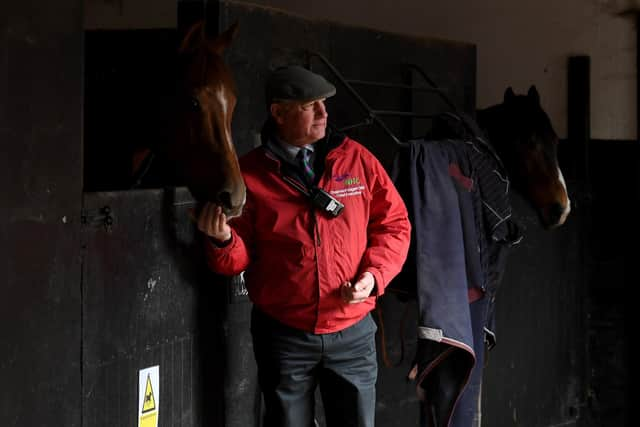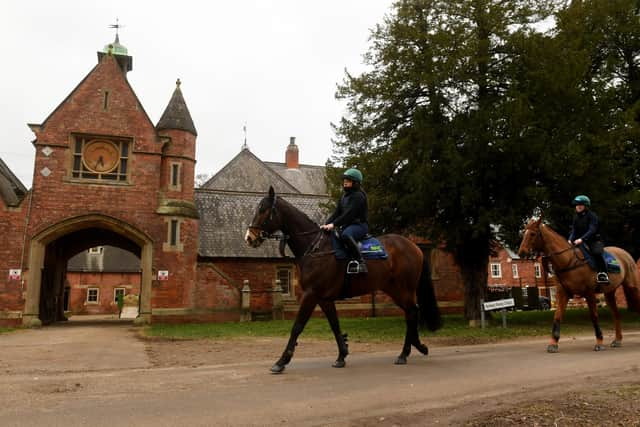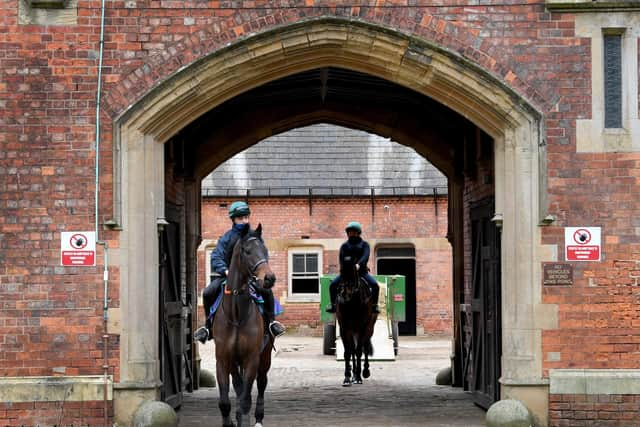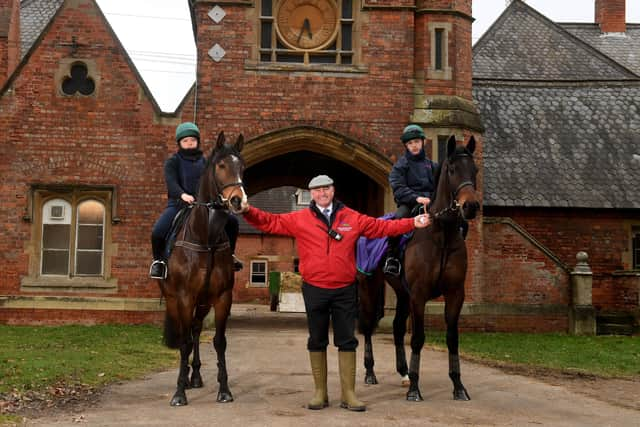National Horseracing College: Inside the jockey training school on the Rossington Hall estate in Yorkshire
Working with animals certainly helps with demeanour. Happy young people are seen either riding out, mucking out, on the gallops, or on the racehorse simulator, that even saw me somewhat pressganged, in friendly manner, into having a go, in front of an appreciative audience. They were very respectful of my efforts, because here it’s really all about encouragement and preparation for a career in the racehorse world.
“Almost everybody else in the industry uses people to train horses,” says Stephen. “We use horses to train people.
Advertisement
Hide AdAdvertisement
Hide Ad“Training of people in the horseracing industry hasn’t always been the highest priority. Here we try to get the industry to give sufficient attention to the ongoing training, development and looking after of its future people, because without people the horses can’t do anything on their own.


The college has recently recorded fantastic Ofsted results and stands as a beacon for how young people can make their way in a career that some may never have thought would be available to them.
Stephen is delighted with the college’s success and its commitment to inclusivity, which he regards as an integral part of the college’s work in providing the racehorse industry with its future generations.
“We really are a recruit training medium for the racing industry. Ninety-two per cent of those who graduate will go into yards and this year we already know that over 120 of those who come here for our Level 1 Diploma foundation course will find jobs in the horseracing industry.
Advertisement
Hide AdAdvertisement
Hide Ad“The foundation course is held over 12 weeks and represents more than a year’s worth of college training anywhere else, because we start at 6.30 in the morning and finish at 8.30pm, six and a half days a week. The amount of learning time is therefore more than a normal college. We have new starters throughout the year as courses are run concurrently with learners at different stages.


“Our racehorse industry-bound students join the foundation course to learn the basic skills to become stable staff who ride and exercise racehorses. We simulate the normal work that goes on at racehorse stables.
“I believe the approach we have to inclusivity and making training opportunities available to as wide a spectrum of people as possible marks us out as unique in training and education. Around a third of our learners who come on the racing foundation course to work with the thoroughbreds have never done anything with a horse before and might never have known this gateway existed.
“This year just over 45 per cent of our learners come from what are regarded, by their postcode, as disadvantaged areas. I’m extremely proud of this statistic as it suggests we are providing lifechanging opportunities to those who might otherwise have felt their prospects were a little more limited.
Advertisement
Hide AdAdvertisement
Hide AdStephen says the college, which originally opened as the South Yorkshire Apprentice Racing Training School in the 1980s, through South Yorkshire County Council, had become the Northern Racing College until changing its name in 2019.


“We have always had a responsibility to young people in this area. We run day release courses for 14-16 year old children at school and these often lead to students leaving school and coming to us on the foundation course and then to a job in the industry.
“If they haven’t already achieved English and Maths at the appropriate level we include teaching those functional skills and interestingly, those who need to achieve those qualifications and haven’t had them previously absolutely thrive in the environment where they do it here because they can then relate it to the thing they are interested in, working with and around horses, for instance trying to work out how much feed a horse needs improves their mathematics and brings a relevance.”
The racehorses at Rossington Hall are all from racing stables, although you’re unlikely to see this year’s Cheltenham Gold Cup winner trotting around. Stephen says it is important to the college that students are working with the real thing.
Advertisement
Hide AdAdvertisement
Hide Ad“We have around 45-50 thoroughbreds at any one time and they all come on loan. Trainers will ring and say they have a horse that’s come to the end of its career on the track. We are told whether it may have been successful, or maybe its talents have been more limited than perhaps anticipated, but it’s a good horse. They give us an outline of it does this, that and the other, where its strengths lie, and that it might be suitable for our purposes for learners to learn about racehorses.


“We then find out a little more about it and it will usually come here on about a six-week trial to see if the horse is suited to our environment and ours is suited to the horse. The recommendations are generally sound and sometimes they stay with us for what can be a number of years.
“A lot of racehorses that come out of racing thrive in an environment like this because it’s entirely familiar to them, the routines, the nature of the work they do, people around them understand them and they understand the environment. What we are certainly not is a racehorse sanctuary. We are simulating a racehorse training environment and we need the horses that are here to be able to continue to do their job.”
The National Horseracing College is part-funded by a contract with the horseracing industry and by a Government contract for training and educating 16-18 year olds, that when combined provide around 80 per cent of its needs. Stephen says the rest is found in a variety of formats and he is more than prepared to beat his chest and give his own personal feelings over the good that the college does and why it should be backed even more greatly.
Advertisement
Hide AdAdvertisement
Hide Ad“I calculated recently from our costs and what we generate funding-wise that one personal training day here costs the industry just £65. If that isn’t good value for money then I don’t know what is. I continue to encourage the racing industry to recognise the extraordinary value we offer. It is a challenge to generate revenue and we do everything from farming the land to letting out parts of our facilities. We are a registered charity and we approach grant-making bodies with submissions based on our very unique offering.
“The opportunities and successes we enable are exciting and also extremely heart-warming. Many of our students say their foundation course is the most important thing they have done in their life and they have made friends they could never imagine to have met anywhere else. If we can harness their enthusiasm, capabilities and fire them up to go out into life with more skills, more confidence and more opportunities, what isn’t to love? We don’t judge them on how they look or how they identify themselves, just on what they do and how they do it.